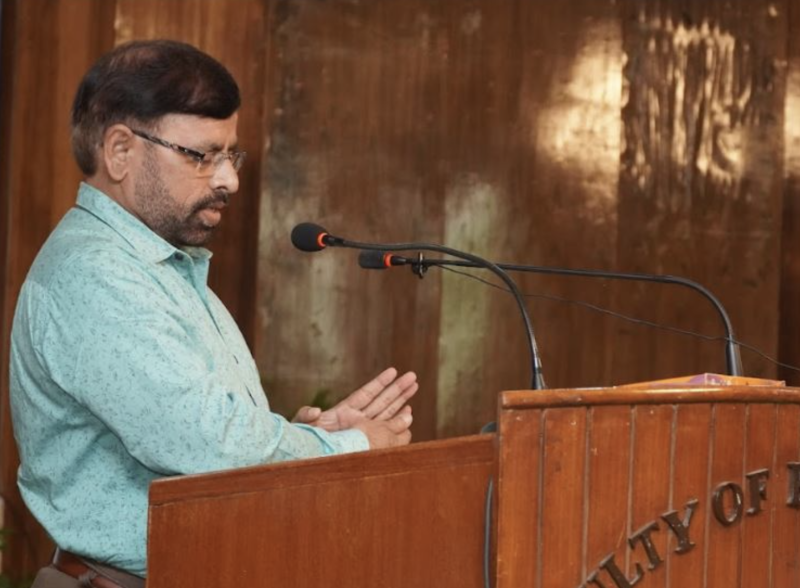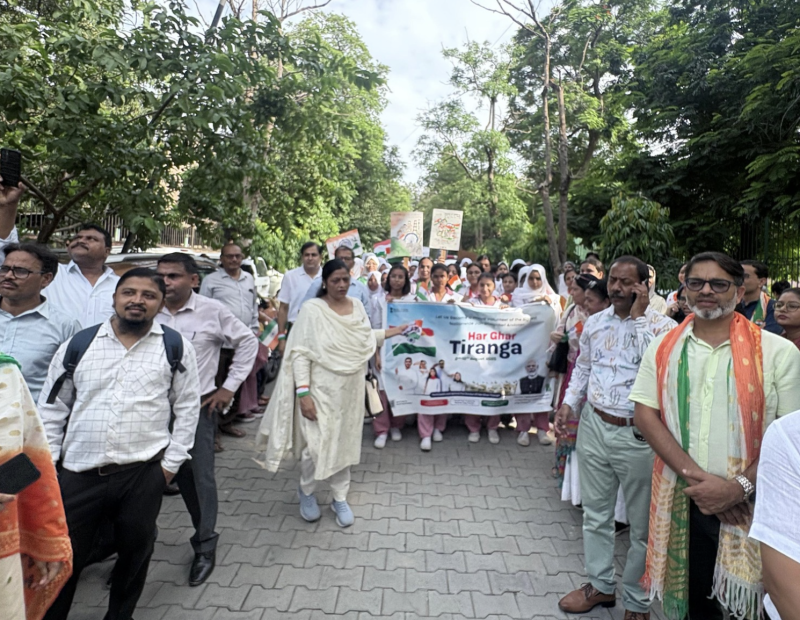The Department of History and Culture of Jamia Millia Islamia, organised the Fifth Mushirul Hasan Memorial Lecture on 11 August 2025, in remembrance of Professor Mushirul Hasan, a distinguished historian, eminent educationist, and former Vice-Chancellor of Jamia Millia Islamia. The lecture series honours Professor Hasan’s legacy as a scholar of modern Indian history, who worked extensively on communalism, nationalism and Muslim identity. Professor Hasan’s tenure as the Vice Chancellor decisively positioned Jamia Millia Islamia as a flourishing intellectual space.
The programme began with the welcome address by Professor Preeti Sharma, Head of the Department of History and Culture. She warmly welcomed the guests, speakers, faculty, and students, recalling Jamia’s socially progressive ethos and the Department’s tradition of critical scholarship. She spoke of Professor Hasan’s distinctive style of historical writing, his role in reshaping the tone of academic discourse, and his contributions to Jamia’s academic and administrative growth.
This was followed by a memorial address by Dr Jawaid Alam, of the Department of History and Culture and a former student of Professor Hasan. Dr Alam offered an affectionate and detailed portrait of his teacher, tracing his 36 years of service to Jamia, his rise to professorship at the age of 32, and his prolific academic career — authoring 17 books and editing 36 others. He highlighted Hasan’s scholarship on figures such as Mohammad Ali Jauhar and his correction of distorted narratives about Muslims in India. Dr Alam also recalled Hasan’s administrative vision as Head of Department, Dean, Pro Vice-Chancellor, and finally Vice-Chancellor, during which he established 30 new centres, created 325 faculty positions, expanded hostels, and strengthened the intellectual culture. The centerpiece of the day’s program was the keynote lecture by Professor Ramachandra Guha, a distinguished historian and biographer, titled “Getting to Know Gandhi: A Biographer’s Journey.” Introducing Professor Guha, Farzana Fazal, a postgraduate student of the department outlined his academic background, including his studies at the Delhi School of Economics and IIM Calcutta, his fellowships at Yale, Stanford, and the LSE, and his wide-ranging works spanning environmental history, politics, and cricket.
In his lecture, Professor Guha recalled his first meeting with Professor Mushirul Hasan in 1982 at the archives, praising Hasan’s openness, generosity, and scholarly leadership. He then outlined his own journey as a biographer of Mahatma Gandhi, highlighting several lesser-known episodes from Gandhi’s life. Moving beyond conservative, teleological narratives of Gandhi and his political movement, Professor Guha explained how Gandhi’s image has been variously interpreted since the 1960s. Through instances ranging from Gandhi’s South African years to his enduring influence on environmental and anti-caste movements, Guha compellingly demonstrated how, over the course of his biographical work, he encountered Gandhi across diverse realms — from the realms of sport and social hierarchy to the environmental concerns exemplified by the Chipko movement. The lecture concluded with reflections on challenges within Indian academia, particularly in the context of biographical writing. This was followed by remarks from Professor S. Irfan Habib, who highlighted the diversity of India’s intellectual traditions and situated Gandhi within this pluralist context.
Professor Mazhar Asif, Vice-Chancellor of Jamia Millia Islamia and the chief guest of the programme, delivered the concluding address. He spoke of his own influences from Gandhi and Premchand and how Jamia has succeeded in carrying forward these legacies. He emphasised Jamia’s philosophy of ilm, ta’leem, and tarbiyat (knowledge, learning, and moral upbringing), noting that moral development must accompany academic growth. He also reflected on the need to address marginalisation, a cause central to Professor Hasan’s work.
The programme was anchored by Saniya Afreen, a postgraduate student of the department, and concluded with a vote of thanks by Hansika, also a postgraduate student of the department, followed by the National Anthem.


.jpg)